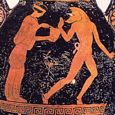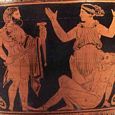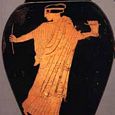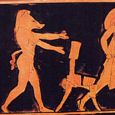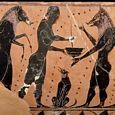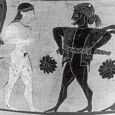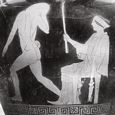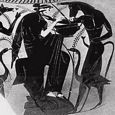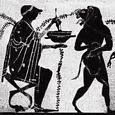KIRKE
Greek Name
Κιρκη
Transliteration
Kirkê
Latin Spelling
Circe
Translation
Hoop Round (kirkoô)
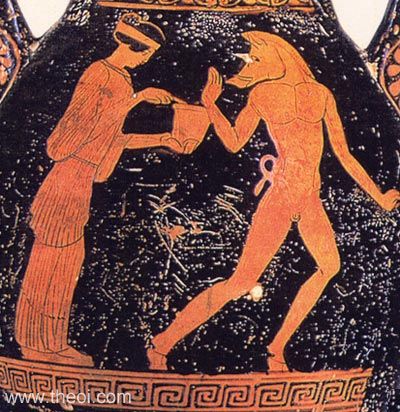
KIRKE (Circe) was a goddess of sorcery (pharmakeia) who was skilled in the magic of transmutation, illusion, and necromancy. She lived on the mythical island of Aiaia (Aeaea) with her nymph companions.
When Odysseus came to her island she transformed his men into beasts but, with the help of the god Hermes, he overcame her and forced her to end the spell.
Kirke's name is derived from the Greek verb kirkoô meaning "to secure with rings" or "hoop around"--a reference to the binding power of magic.
Kirke's island of Aiaia (Aeaea) was located in the far west, near the earth-encircling River Okeanos (Oceanus). Her brother Aeetes' realm in the far east was similarly named Aia (Aea).
FAMILY OF CIRCE
PARENTS
[1.1] HELIOS & PERSEIS (Homer Odyssey 10.135, Hesiod Theogony 956, Apollodorus 1.80, Apollonius Rhodius
4.584)
[1.2] HELIOS (Homer's Epigrams XIV, Hyginus Fabulae 199,
Ovid Metamorphoses 13.898, Valerius Flaccus 7.210)
[1.3] AEETES & HEKATE (Diodorus Siculus
4.45.1)
OFFSPRING
[1.1] AGRIOS, LATINOS (by Odysseus) (Hesiod Theogony 1011)
[1.2] TELEGONOS (by Odysseus) (Homerica Returns Frag 4, Homerica Telegony Frag 1,
Plutarch Greek Roman Parallel Stories 41, Hyginus Fabulae 127, Oppian Halieutica 2.497)
[1.3] NAUSITHOUS, TELEGONOS (by Odysseus) (Hyginus Fabulae 125)
[2.1] LATINOS (by Telemakhos) (Hyginus Fabulae 127)
[3.1] PHAUNOS (by Poseidon)
(Nonnus Dionysiaca 13.327 & 37.10)
ENCYCLOPEDIA
CIRCE (Kirkê), a mythical sorceress, whom Homer calls a fair-locked goddess, a daughter of Helios by the Oceanid Perse, and a sister of Aeëtes. (Od. x. 135.) She lived in the island of Aeaea; and when Odysseus on his wanderings came to her island, Circe, after having changed several of his companions into pigs, became so much attached to the unfortunate hero, that he was induced to remain a whole year with her. At length, when he wished to leave her, she prevailed upon him to descend into the lower world to consult the seer Teiresias. After his return from thence, she explained to him the dangers which he would yet have to encounter, and then dismissed him. (Od. lib. x.--xii.; comp. Hygin. Fab. 125.) Her descent is differently described by the poets, for some call her a daughter of Hyperion and Aerope (Orph. Argon. 1215), and others a daughter of Aeëtes and Hecate. (Schol. ad Apollon. Rhod. iii. 200.) According to Hesiod (Theog. 1011) she became by Odysseus the mother of Agrius. The Latin poets too make great use of the story of Circe, the sorceress, who metamorphosed Scylla and Picus, king of the Ausonians. (Ov. Met. xiv. 9, &c.)
AEAEA (Aiaia). A surname of Circe, the sister of Aeëtes. (Hom. Od. ix. 32; Apollon. Rhod. iv. 559; Virg. Aen. iii. 386.) Her son Telegonus is likewise mentioned with this surname. (Acaeus, Propert. ii. 23. § 42.)
Source: Dictionary of Greek and Roman Biography and Mythology.
CLASSICAL LITERATURE QUOTES
PARENTAGE OF CIRCE
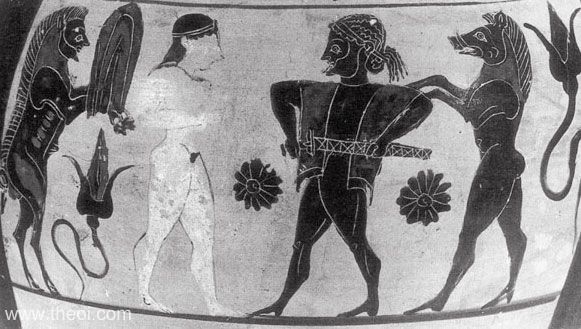
Homer, Odyssey 10. 135 ff (trans. Shewring) (Greek epic C8th B.C.) :
"Kirke (Circe), a goddess with braided hair, with human speech and with strange powers; baleful Aeetes was
her brother, and both were radiant Helios the sun-god's children; their mother was Perse, Okeanos' (Oceanus')
daughter."
Hesiod, Theogony 956 ff (trans. Evelyn-White) (Greek epic C8th or C7th B.C.)
:
"And Perseis, the daughter of Okeanos (Oceanus), bare to unwearying Helios (the Sun) Kirke (Circe) and
Aeetes the king."
Pseudo-Apollodorus, Bibliotheca 1. 80 (trans. Aldrich) (Greek mythographer C2nd A.D.)
:
"The Kholkhians (Colchians) who were ruled by Aeetes, the son of Helios and Perseis, and brother of Kirke
(Circe) and Minos' wife Pasiphae."
Apollonius Rhodius, Argonautica 4. 584 ff (trans. Rieu) (Greek epic C3rd B.C.)
:
"Kirke (Circe), daughter of Perse and Helios."
Diodorus Siculus, Library of History 4. 45. 1 (trans. Oldfather) (Greek historian
C1st B.C.) :
"[A late rationalisation of the myth of Kirke (Circe) :] She [Hekate (Hecate), daughter of Perses the
brother of Aeetes] married Aeetes and bore two daughters, Kirke (Circe) and Medea, and a son Aigialeus."
CIRCE SETTLES ON THE ISLE OF AEAEA
Hesiod, Catalogues of Women Fragment 46 (from Scholiast on Apollonius Rhodius 3. 311)
(trans. Evelyn-White) (Greek epic C8th or C7th B.C.) :
"Apollonios (Apollonius), following Hesiod, says that Kirke (Circe) came to the island over against
Tyrrhenia on the chariot of Helios. And he called it Hesperian, because it lies towards the west."
Apollonius Rhodius, Argonautica 3. 311 ff (trans. Rieu) (Greek epic C3rd B.C.)
:
"[Aeetes addresses the Argonauts :] ‘I myself was whirled along it in the chariot of my father Helios
(the Sun), when he took my sister Kirke (Circe) to the Western Land and we reached the coast of Tyrrhenia, where
she lives, far, far indeed from Kolkhis (Colchis).’"
Valerius Flaccus, Argonautica 7. 120 ff (trans. Mozley) (Roman epic C1st A.D.)
:
"Circe was borne away [from the land of Kolkhis (Colchis)] by winged Dracones (Dragons)."
CIRCE, THE ARGONAUTS & THE WEDDING OF MEDEA
Apollonius Rhodius, Argonautica 4. 584 ff (trans. Rieu) (Greek epic C3rd B.C.)
:
"It [the talking beam of the ship Argo] threatened them [the Argonauts] with endless wanderings across
tempestuous seas till Kirke (Circe) should have purged them of the cruel murder of Apsyrtos (Apsyrtus) [Medea's
brother]; and it bade Polydeukes (Polydeuces) and Kastor ((Castor) beg the immortal gods to grant them access to
the Italian Sea, where they would find Kirke, daughter of Perse and Helios."
Apollonius Rhodius, Argonautica 4. 662 ff :
"Passing swiftly over the Ausonian Sea, with the Tyrrhenian coast [of Italy] in sight, they [the Argonauts]
came to the famous haven of Aia (Aea), took Argo close in, and tied up to the shore.
Here they found Kirke (Circe) bathing her head in the salt water. She had been terrified by a nightmare in which
she saw all the rooms and walls of her house streaming with blood, and fire devouring all the magic drugs with
which she used to bewitch her visitors. But she managed to put out the red flames with the blood of a murdered
man, gathering it up in her hands; and so the horror passed. When morning came she rose from bed, and now she
was washing her hair and clothes in the sea.
A number of creatures whose ill-assorted limbs declared them to be neither man nor beast had gathered round her
like a great flock of sheep following their shepherd from the fold . . . The Argonauts were dumbfounded by the
scene. But a glance at Kirke's form and eyes convinced them all that she was the sister of Aeetes.
As soon as she had dismissed the fears engendered by her dream, Kirke set out for home, but as she left she
invited the young men to come with her, beckoning them on in her own seductive way. Iason Told them to take no
notice, and they all stayed where they were. But he himself, bringing Medea with him, followed in Kirke's steps
till they reached her house. Kirke, at a loss to know why they had come, invited them to sit in polished chairs;
but without a word they made for the hearth and sat down there after the manner of suppliants in distress. Medea
hid her face in her hands, Iason fixed in the ground his great hilted sword with which he had killed Apsyrtos
(Apsyrtus), and neither of them looked her in the face. So she knew at once that these were fugitives with
murder on their hands and took the course laid down by Zeus, the god of suppliants, who heartily abhors the
killing of a man, and yet as heartily befriends the killer. She set about the rites by which a ruthless slayer
is absolved when he seeks asylum at the hearth. First, to atone for the unexpiated murder, she took a suckling
pig from a sow with dugs still swollen after littering. Holding it over them she cut its throat and let the
blood fall on their hands. Next she propitiated Zeus with other libations, calling on him as the Cleanser, who
listens to a murderer's prayers with friendly ears. Then the attendant Naiades (Naiads) who did her housework
carried all the refuse out of doors. But she herself stayed by the hearth, burning cakes and other wineless
offerings with prayers to Zeus, in the hope that she might cause the loathsome Erinyes to relent, and that he
himself might once more smile upon this pair, whether the hands they lifted up to him were stained with a
kinsman's or a strangers blood.
When all was done she raised them up, seated them in polished chairs and taking a seat near by, where she could
watch their faces, she began by asking them to tell her what had brought them overseas, from what port they had
sailed to visit her and why they had sought asylum at her hearth. Horrible memories of her dream came back to
her as she wondered what was coming; and she waited eagerly to hear a kinwoman's voice, as soon as the girl had
looked up from the ground and she noticed her eyes. For all the Children of Helios were easy to recognise, even
from a distance, by their flashing eyes, which shot out rays of golden light.
Medea, daughter of Aeetes the black-hearted king, answered all her aunt's questions, speaking quietly in the
Kokhian (Colchian) tongue. She told her of the quest and voyage of the Argonauts, of their stern ordeal, and how
she herself had been induced to sin by her unhappy sister and had fled from her father's tyranny with Phrixos'
(Phrixus') sons; but she said nothing of the murder of Apsyrtos. Not that Kirke was deceived. Nevertheless she
felt some pity for her weeping niece.
‘Poor girl,’ she said, ‘you have indeed contrived for yourself a shameful and unhappy
home0coming; for I am sure you will not long be able to escape your father's wrath. The wrongs you have done are
intolerable, and he will soon be in Hellas to avenge his son's murder. However, since you are my suppliant and
kinswoman, I will not add to your afflictions now that you are here. But I do demand that you should leave my
house, you that have linked yourself to this foreigner, whoever he may be, this man of mystery whom you have
chosen without your father's consent. And do not kneel to me at my hearth, for I never will approve your conduct
and your disgraceful flight.’
Medea's grief, when she heard this, was more than she could bear. She drew her robe across her eyes and wailed
till Iason took her by the hand and led her out of doors shivering with fear. Thus they left Kirke's
house."
Strabo, Geography 5. 2. 6 (trans. Jones) (Greek geographer C1st B.C. to C1st A.D.)
:
"There is at Aithalia [in Italy] a Port Argoos, from the ship ‘Argo’, as they say; for when
Iason (Jason), the story goes, was in quest of the abode of Kirke (Circe), because Medea wished to see the
goddess, he sailed to this port."
Valerius Flaccus, Argonautica 7. 210 ff (trans. Mozley) (Roman epic C1st A.D.)
:
"Of a sudden Venus [Aphrodite] was sitting on her [Medea's] bed, changed as she was from heavenly shape and
counterfeiting Circe, Titan's [Helios'] daughter, with broidered robe and magic wand. But the girl, as though
mocked by the lingering image of a dream, gazes perplexed and only little by little deems her to be the sister
of her mighty sire; then in tearful joy she sprang forward and of her own accord kissed the cruel goddess, and
first addressed her : ‘Circe! At last, scarce at last, cruel one! Restored to thine own--why did the yoked
snakes bear thee hence in flight? What sojourning was more pleasing to thee than my father's land . .
.’
Then Venus [masquerading as Circe] checks further speech and thus rejoins : ‘Thou alone art the cause of
this my journey; I come knowing long since thou art no longer a child; spare thy complaints, nor blame me who
have chosen a better lot; nay, that now we may bear in mind heaven's gifts, deem rather that this world is
shared by all living souls, and shared too are the gods. Call that thy country where the sun goes forth and back
again; seek not, my child, with unfeeling heart to imprison me in this eternal cold. I had a right--as thou too
hast--to leave the unprofitable Colchians. And now am I Ausonian Picus' royal consort, nor are my meadows there
unsightly with flame-breathing bulls: in me thou beholdest the mistress of the Tuscan Sea. But what kind of
suitors are the Sauromatae for thee, poor child? . . .’
Straightway she spoke in answer, scorning the goddess' words : ‘Not so forgetful of great Perseis [Hekate]
doest thou see me as to be driven, a hapless victim, into such wedlock.’ [I.e., she has her magic to fall
back to avoid such a marriage.]"
CIRCE & ODYSSEUS
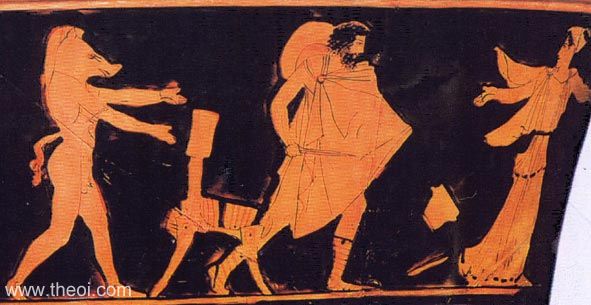
Homer, Odyssey 10. 135 - 12. 156 (trans. Shewring) (Greek epic C8th B.C.)
:
"[Odysseus sailed forth from the land of the Laistrygones (Laestrygones) and came next to the island of
Kirke (Circe) :] Then we came to the island of Aiaia (Aeaea); here Kirke (Circe) dwelt, a goddess with braided
hair, with human speech and with strange powers; the magician Aeetes was her brother, and both were radiant
Helios the sun-god's children; their mother was Perse, Okeanos' (Oceanus') daughter. We brought the ship
noiselessly to shore, and with some divinity for guide we put in at the sheltering harbour. We disembarked, and
for two days and two nights we lay there, eating out our hearts with sorrow and weariness.
But when Eos the Dawn of the braided hair brought the third day at last, I took my spear and my sharp sword and
hastened up to a vantage-point, hoping to see some human handiwork or to catch the sound of some human speech. I
climbed a commanding crag, and from where I stood had a glimpse of smoke rising from the ground. There were
gleams of fire through the smoke, and at sight of this I wondered inwardly whether to go and look. But as I
pondered, it seemed a wiser thing to return first to my vessel on the beach, give my men a meal and then send
them out to spy. I was on my way back and near the ship when some divinity pities me in my loneliness and sent a
great antlered stag right across my path [perhaps a man that Kirke had transformed into an animal]; it was going
down to its feeding-ground in the wood to drink the river-water . . . As it left the wood I struck it upon the
spine, half-way down the back. The spear of bronze went right through, and with one cry the stag fell in the
dust and its breath departed . . .
Eos the dawn comes early, with rosy fingers. When she appeared, I assembled all my men together and thus
addressed them : ‘Comrades, as things now are, we do not know where the region of dawn or of darkness
lies, in what quarter the radiant sun sinks below the earth or in what quarter he rises up. Let us ask ourselves
quickly if some good plan may yet be found, though I fear there is none. When I climbed that commanding crag, I
could see that we were in an island encircled by boundless ocean. The main part of the land lies low, and in the
mid-point of it I saw smoke rising across thick undergrowth and woodland.’
So I spoke and their hearts quailed within them as they thought again of the deeds of Antiphates the Laistrygon
(Laestrygonian) and the fierce and fearful and man-devouring Kyklopes (Cyclopes). They wept aloud, and the great
tears rolled down their cheeks, though lamentation availed them nothing.
I divided my crew into two companies, and gave each its own leader; I myself captained one, Eurylokhos
(Eurylochus) the other. Then we shook the lots in a bronze helmet, and the lot that leapt out was that of bold
Eurylokhos. So he went on his way, and twenty-two comrades with him; themselves in tears, they left the rest of
us weeping too. In the glades they found the palace of Kirke (Circe), built of smooth stones on open ground.
Outside, there were lions and mountain wolves that she had herself bewitched by giving them magic drugs. The
beasts did not set upon my men; they reared up, instead, and fawned on them with their long tails. As dogs will
fawn around their master when he comes home from some banquet, because he never fails to bring back for them a
morsel or two to appease their craving, so did these lions, these wolves with their powerful claws, circle
fawningly round my comrades. The sight of the strange huge creatures dismayed my men, but they went on and
paused at the outer doors of the goddess of braided hair. And now they could hear Kirke within, singing with her
beautiful voice as she moved to and fro at the wide web that was more than earthly--delicate, gleaming,
delectable, as a goddess' handiwork needs must be--a goddess or a woman, moving to and fro at her wide web and
singing a lovely song that the whole floor re-echoes with.. Then Polites spoke to the rest there ‘Come,
let us make ourselves heard at once.’
So he spoke. The men called out and made themselves heard; she came forth at once, she opened the shining doors,
she called them to her, and in their heedlessness they all entered, all but Eurylokhos; he stayed outside,
foreboding mischief. The goddess ushered them in, gave them all seats, high or low, and blended for them a dish
of cheese and of barley-meal, of yellow honey and Pramnian wine, all together; but with these good things she
mingled pernicious drugs as well, to make them forget their own country utterly. Having given them this and
waited for them to have their fill, she struck them suddenly with her wand, then drove them into the sties where
she kept her swine. And now the men had the form of swine--the snout and grunt and bristles; only their minds
were left unchanged. They shed tears as they were shut in, while Kirke threw down in front of them some acorns
and mast and cornel--daily fare for swine whose lodging is on the ground.
Eurylokhos hastened back to the ship to tell the news of his comrades' dismal fate. But for all his zeal he
could not bring out one word, so wrung was hi heart with its great sorrow; the tears were standing in his eyes,
and his thoughts were all of lamentation. We questioned him, all of us, in bewilderment, and at last he found
plain words to tell how our other friends had been lost to us : ‘Noble Odysseus, we went, as you bade us,
through the thickets, and in the glades we found before us a stately palace. Someone inside it, a goddess or a
woman, was singing in high pure notes as she moved to and fro at her wide web. The men called out and made
themselves heard; she came out at once, she opened the shining doors and she called them to her. They in their
heedlessness all entered; only I myself foreboded mischief and stayed outside. They vanished utterly, all of
them; not one among them appeared again, though I sat a long while there, keeping watch.’
So he spoke. I slung across my shoulders my great silver-studded sword of bronze; I slung on my bow as well,
then told him to guide me back by the same path. But he clutched my knees with both his hand and made
supplication : ‘Heaven-favoured king, do not force me back that way again; leave me here. I know you will
neither return yourself nor yet bring back any of your comrades. Instead, let us flee from this place at once,
taking these others with us; we may still escape the day of evil.’
Such were his words. I answered thus : ‘So be it, Eurylokhos; keep your own place here, eating and
drinking beside the ship; I must go yonder; stern necessity is upon me.’
And with that I left the ship and shore and took the path upward; but as I traversed those haunted glades, as I
came close to Kirke's house and neared the palace of the enchantress, I was met by golden-wanded Hermes; he
seemed a youth in the lovely spring of life, with the first down upon his lip. He seized my hand and spoke thus
to me : ‘Luckless man, why are you walking thus alone over these hills, in country you do not know? Your
comrades are yonder in Kirke's grounds; they are turned to swine, lodged and safely penned in the sites. Is your
errand her to rescue them? I warn you, you will never return yourself, you will only be left with the others
there. Yet no--I am ready to save you from all hazards, ready to keep you unscathed. Look. Here is a herb of
magic virtue; take it and enter Kirke's house with it; then the day of evil never will touch your head. I will
tell you of all her witch's arts. She will brew a potion for you, but with good things she will mingle drugs as
well. Yet even so, she will not be able to enchant you; my gift of the magic herb will thwart her. I will tell
you the rest, point by point. When Kirke strikes you with the long wand she has, draw the keen sword from beside
your thigh, rush upon her and make as if to kill her. She will shrink, back, and then ask you to lie with her.
At this you must let her have her way; she is a goddess; accept her bed, so that she may release your comrades
and make you her cherished guest. But first, make her swear the great oath of the Blessed Ones [by the river
Styx] to plot no mischief to you thenceforward--if not, while you lie naked there, she may rob you of courage
and of manhood.’
So spoke the Radiant One; then gave the magic herb, pulling it from the ground and showing me in what form it
grew; its root was black, its flower milk-white. Its name among the gods is moly. For mortal men it is perilous
to pluck it up, but for the gods all things are possible.
Then Hermes departed over the wooded island went his way to the mountain of Olympos. I myself passed on to
Kirke's palace, with my thoughts in turmoil as I walked. I paused at the doorway of the goddess, and standing
there I gave a great cry; she heard my voice and came out quickly, opening the shining doors and calling me in.
I went up to her though my heart sank. She ushered me in and gave me a tall silver-studded chair to sit
in--handsome and cunningly made it was--with a stool beneath it for the feet. In a golden goblet she brewed a
potion for me to drink, and treacherously mingled her drug with it. When I had taken and drunk it up and was
unenchanted still, she struck at me with her wand, and ‘Now’ she said ‘be off to the sty, to
wallow with your companions there.’
So she spoke, but I drew the keen sword from beside my thigh, rushed at her and made as if to kill her. She
shrieked, she slipped underneath my weapon, she clasped my knees and spoke in rapid appealing words: ‘Who
are you, and from where? Where are your city and your parents? It bewilders me that you drank this drug and were
not bewitched. Never has any other man resisted this drug, once ha head drunk it and let it pass his lips. But
you have an inner will that is proof against sorcery. You must surely be that man of wide-ranging spirit,
Odysseus himself; the Radiant One of the golden wand [Hermes] has told me of you; he always said that Odysseus
would come to me on his way from Troy in his dark and rapid vessel. But enough of this; sheathe your sword; then
let us go to bed together, and embracing there, let us learn to trust in one another.’
So she spoke, but I answered her : ‘Kirke, how can you ask me to show you gentleness? In this very house
you have turned my comrades into swine, and now that you have me also here you ask me in your treacherousness to
enter your room and lie with you, only that when I lie naked you may rob me of courage and of manhood. Never,
goddess, could I bring myself to lie with you unless you consented first to swear a great oath to plot no
mischief to me henceforward.’
So I spoke, and she swore at once the thing I asked for. When Kirke had uttered the due appointed words, I lay
down at last in her sumptuous bed.
All this while, four handmaids of hers were busying themselves about the palace. She has them for her household
tasks, and they come from springs [Naiades], they come from groves [Dryades], they come from the sacred rivers
flowing seawards [Naiades]. One spread the chairs with fine crimson covers above and with linen cloths beneath;
in front of the chairs, a second drew up silver tables on which she laid gold baskets for bread; a third mixed
honey-sweet lovely wine in a silver bowl sand set the golden goblets out; the fourth brought water and lit a
great fire under a massive cauldron. The water warmed; and when it boiled in the bright bronze vessel, the
goddess made me sit in a bath and bathed me with water from the cauldron, tampering hot and cold to my mind and
pouring it over my head and shoulders until she had banished from my limbs the weariness that had sapped my
spirit. And having washed me and richly appointed me with oil, she dressed me in a fine cloak and tunic, led me
forward and gave me a tall silver-studded chair to sit on--handsome and cunningly made--with a stool beneath it
for the feet. She bade me eat, but my heart was not on eating, and I sat with my thoughts elsewhere and my mind
unquiet.
When Kirke saw me sitting thus, not reaching for food but sunk in despondency, she came and stood near me,
quickly questioning : ‘Odysseus, why do you sit there tongue-tied eating your heart out, not touching food
or drink? Can it be that you fear some further treachery? You should have no doubts; I have sworn the great oath
already.'
So she spoke, but I answered her : `Kirke, what man of righteous thoughts could bring himself to taste food or
drink before winning liberty for his friends and seeing the men before his eyes? If it is in earnest that you
tell me to eat and drink, release them now, and let me see my trusty companions face to face.’
So I spoke, and Kirke went through the hall and out, wand in hand; she flung open the doors of the sty and set
the men running out in the shape of fat and full-grown swine. Then they stood facing her, and she went to and
fro among them, anointing them one by one with another charm. Their limbs began to shed the bristles that
Kirke's poison had planted on them, and they became men again, but younger than they had been before, and taller
and handsomer to the eye. They knew me at once, and man after man they clasped my hand. A melting mood stole
upon them all, and they sobbed aloud till the house re-echoed dolefully. Kirke herself felt compassion; then she
came up and said to me : ‘Son of Laertes, subtle Odysseus, now go back to your rapid vessel by the beach.
First, with your men, haul the ship ashore; then fetch out all your gear and goods and stow them inside the
caves; then return yourself and bring your trusty companions with you.’
Such were her words, and my own heart desired nothing better. I went my way to the rapid vessel by the beach,
and there I found my comrades aboard; they were shedding big tears and lamenting piteously . . . Lamenting they
spoke to me in words that went home: ‘Heaven-favoured king, we are as happy at your return as if we had
reached our own native land again, Ithaka (Ithaca) itself. But now you must tell from first to last how our
other friends were lost to us.’
So they spoke; I answered them with consoling words : ‘First let us haul the ship ashore, then take out
all our gear and goods and stow them inside the caves; after that, make haste to come with me, all of you, and
to see your friends in the goddess Kirke's palace, eating and drinking; they have enough and to
spare.’
So I spoke, and the men were quick to do my bidding; only Eurylokhos endeavoured to keep them back :
‘Wretched men, where are we going? Why do you court disaster thus, why venture down to Kirke's dwelling?
She will turn us all into swine or wolves or lions, to guard her palace whether we will or no; just as the
Kyklopes (Cyclopes) penned our companions in when they reached his steading--foolhardy Odysseus went in with
them, and his presumption was their undoing.’
So he spoke; I was half minded to draw the long keen sword from my sturdy thigh, strike off his head and send it
to meet the ground, although he was close of kin to me; but my men all round me restrained me with pacifying
words : ‘Heaven-born one, let us leave this man, if you consent, to stay by the ship and guard it. As for
the rest of us, we ask you to guide us on the way to the palace of the goddess Kirke.’
And with these words they began to walk, leaving the vessel and the sea. Nor did Eurylokhos linger there; he
came with the rest, dreading my powerful indignation.
In the meantime inside her palace Kirke had bathed the others hospitably, had richly anointed them with oil and
had clothed them in tunics and fleecy cloaks; we found them dining in the hall, every man of them. When the two
groups spied each other--when the men looked each other in the face--they began to weep and make lamentation
till the house around them echoed with it. But the goddess came up and said to me : ‘Son of Laertes,
subtle Odysseus, you must all give over these loud lamentations you are making. I myself well know what
tribulations you have endured on the teeming sea and what injustices you have borne from barbarous men on land.
But enough! Eat your food and drink your wine till you have regained the same spirit that you had when you first
set sail from your own country, rocky Ithaka. You are listless now, you are spiritless, brooding for ever and
for ever on the calamities of your wanderings. Your hearts are never disposed to mirth, because you have
suffered all too much.’
Such were her words, and our hearts accepted them.
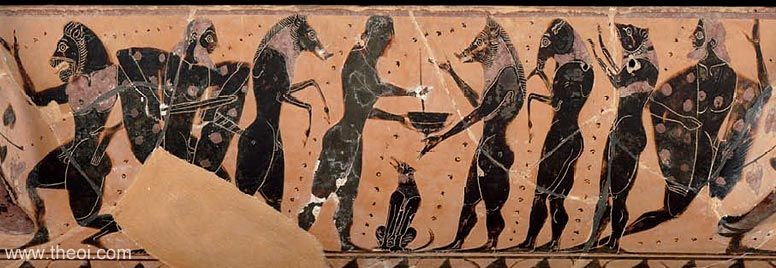
"So every day, till the year's end, we sat there feasting on plenteous meat and delicious wine. When the
year was out and the seasons had circled round, then my comrades called me apart and said : ‘Forgetful
man, it is time now to call your own land to mind once more, if indeed heaven means you tom come safe home to
your lofty house and the country of your fathers.’
Such were their words, and my heart accepted them. So all that day, till the sun set, we sat and feasted on
plenteous meat and delicious wine. When the sun went and darkness came, the men lay down to sleep in the shadowy
halls, but I, returning to Kirke's sumptuous bed, clasped her knees and made supplication to her, and the
goddess heard my plea : ‘Kirke, you gave me once your promise to help me homewards, and the time has come
to make it good; my own desire is set that way, and the desire of my comrades also--they are there around me,
vexing my heart with their lamentations when once you yourself are out of sight.’
The goddess answered my words forthwith : ‘Son of Laertes, subtle Odysseus, if it is in spite of
yourselves that you all stay in my palace still, then you must stay here no longer. But another path must be
travelled first; you must visit the house of dread Persephone and of Haides, and there seek counsel from the
spirit of Theban Teiresias (Tiresias). The blind seer's thought is wakeful still, for to him alone, even after
death, Persephone has accorded wisdom; the other dead are but flitting shadows.’
So she spoke; my spirit was crushed within me. I sank down on the bed and wept, and my heart lost the desire to
live or to look longer upon the sunlight. I wept, I writhed till the bout of bitterness was past. At length I
answered and said to her : ‘But Kirke, who will pilot me on my voyage? Never since time began has the dark
ship of any traveller brought him to Haides' house.’
And at once the goddess answered me : ‘Son of Laertes, subtle Odysseus, when you reach your ship, no lack
of a pilot need trouble you. Raise the mast, spread the white sail and seat yourself : the north wind's
breathing will waft the vessel on. When you have sailed through the river Okeanos (Oceanus), you will see before
you a narrow strand and the groves of Persephone's--the tall black poplars, the willows with their self-wasted
fruit; then beach the vessel beside deep-eddying Okeanos and pass on foot to the dank domains of Haides. At the
entrance there, the stream of Akheron (Acheron) is joined by the waters of Pyriphlegethon and of a branch of
Styx, Kokytos (Cocytus), and there is a rock where the two loud-roaring rivers meet. Then, Lord Odysseus, you
must do as I enjoin you; [N.B. She then instructs Odysseus in the art of necromancy:] go forward, and dig a
trench a cubit long and a cubit broad; go round this trench, pouring libation for all the dead, first with milk
and honey, then with sweet wine, then with water; and sprinkle white barley-meal above. Then with earnest
prayers to the strengthless presences of the dead you must promise that when you have come to Ithaka you will
sacrifice in your palace a calfless heifer, the best you have, and will load a pyre with precious things; and
that for Teiresias and no other you will slay, apart, a ram that is black all over, the choicest of the flocks
of Ithaka.
‘When with these prayers you have made appeal to the noble nations of the dead, then you must sacrifice a
ram and a black ewe; bend the victim's heads down towards Erebos (Erebus), but turn your own head away and look
towards the waters of the river. At this, the souls of the dead and gone will come flocking there. With
commanding voice you must call your comrades to flay and burn the two sheep that now lie before them, killed by
your own ruthless blade, and over them to pray to the gods, to resistless Haides and dread Persephone. As for
yourself, draw the keen sword from beside your thigh; then, sitting down, hold back the strengthless presences
of the dead from drawing nearer to the blood until you have questioned Teiresias. Then, King Odysseus, the seer
will come to you very quickly, to prophesy the path before you, the long stages of your travel, and how you will
reach home at last over the teeming sea.'
Scarcely had she ended her words when Eos the Dawn appeared in her flower cloth of gold. Kirke gave me my tunic
and cloak to wear; she herself put on a big silvery mantle, graceful and delicate; she fastened a lovely gold
girdle round her waist and slipped a scarf over her head. Then I went through the halls and roused my comrades,
standing near each in turn and uttering persuasive words : ‘You have slept enough; give over that drowsy
pleasure now. It is time to go--Lady Kirke has shown me how and where.’
So I spoke; and the men agreed gladly enough. Yet not even from this adventure could I bring my comrades away
unscathed. There was one of them called Elpenor, the youngest of all, neither brave in battle nor firm in mind;
he had left the rest of my company and had lain down on the top of Kirke's house, heavy with wine and seeking
the cool. When my comrades began to stir and he heard the sound of their feet and voices, he leapt up in haste
and quite forgot to take the long ladder downwards and so return. Instead, he fell headlong from the roof; his
neck was wrenched away from the spine, and his would went down to the house of Haides.
As the rest came out I had words to say to them : ‘Doubtless you think you are on your way to your own
homes, to your own country. But no; Kirke has said we must sail elsewhere, to the house of Haides and dread
Persephone; we are to ask counsel there of Theban Teiresias.’
So I spoke, and their hearts were crushed within them. They sank down on the ground where they were and began to
groan and tear their hair; but no good could come of this lamentation.
While we made our melancholy way to the ship at the sea's edge, weeping without restraint, Kirke already had
passed before us and tethered a ram and a black ewe beside the vessel. She had slipped past us unperceived; what
eyes could discern a god in his comings and his goings if the god himself should wish it otherwise?
We reached our ship at the sea's edge and hauled it down to the bright water, then stowed the mast and the sails
inside; we took the sheep and put them aboard; last of all, we ourselves embarked, still despondent, weeping
still unrestrainedly. But Kirke of the braided tresses, the goddess of awesome powers and of human speech, sent
the best of comrades after our dark-prowed vessel, a following breeze to fill our sails. We made fast the
tackling everywhere, then seated ourselves while wind and the helmsman bore the ship forward on her course. The
sails were taut as she sped all day across the sea till the sun sank and light thickened on every pathway.
The vessel came to the bounds of eddying Okeanos (Oceanus), where lie the land and the city of the Kimmerians
(Cimmerians), covered with mist and cloud. [N.B. The Kimmerians were a Skythian (Scythian) tribe who lived north
of the Kaukasos (Caucasus), Homer places the island of Kirke in this eastern region.] Never does the resplendant
sun look on this people with his beams, neither when he climbs towards the stars of heaven nor when once more he
comes earhtwards form the sky; dismal gloom overhands these wretches always . . . [Odysseus reaches the borders
of Haides and performs the rites of necromancy as instructed by Kirke before returning to her island.]
The ship in due course left the waters of the river Okeanos and reached the waves of the spacious sea and the
island of Aiaia (Aeaea; it is there that Eos the Dawn the early comer has her dwelling place and her
dancing-ground, and Helios the sun himself has his risings. [N.B. gain Homer clearly places Aiaia in the
farthest East.] We came in; we beached our vessel upon the sands and disembarked upon the sea-shore; there we
fell fast asleep, awaiting ethereal Eos the Dawn.
Eos the Dawn comes early, with rosy fingers. When she appeared I sent my comrades to Kirke's palace to fetch the
body of dead Elpenor [and buried the man as Odysseus had promised his ghost in Haides] . . .
Our coming back did not escape the watchfulness of Kirke. She attired herself and hastened towards us, while the
handmaidens with her brought bread and meat in plenty, and glowing red wine. Then, coming forward to stand among
us, the queenly goddess began to speak : ‘Undaunted men who went down alive to Haides' dwelling, men fated
to taste death twice over, while other men taste of it but once,--come now, eat food and drink wine here all
day. At break of morning you must set sail, and I myself will tell you the way and make each thing clear, so
that no ill scheming on sea or land may bring you to misery and mischief.’
Such were her words, and our own hearts accepted them. So all that day, till the sun set, we sat and feasted on
plenteous meat and delicious wine. When the sun went and darkness came, my men lay down to sleep by the vessel's
hawsers, but as for myself, the goddess took me by the hand and made me sit down apart; she lay down near me and
questioned me about everything, and I told her all from first to last. Then Lady Kirke began again : ‘The
things you speak of are all fulfilled, then; but listen now to my further words--later, without your seeking it,
some god will recall them to your mind. You will come to the Seirenes first of all; they bewitch any mortal who
approaches them. If a man in ignorance draws too close and catches their music, he will never return to find
wife and little children near him and to see their joy at his homecoming; the high clear tones of the Seirenes
(Sirens) will bewitch him. They sit in a meadow; men's corpses lie heaped up all around them, mouldering upon
the bones as the skin decays. You must row past there; you must stop the ears of all your crew with sweet wax
that you have kneaded, so that none of the rest may hear the song. But if you yourself are bent on hearing, then
give them orders to bind you both hand and foot as you stand upright against the mast-stay, with the rope-ends
tied to the mast itself; thus you may heart he two Seirenes' voices and be enraptured. If you implore your crew
and beg them to release you, then they must bind you fast with more bonds again.
‘When your crew have rowed past the Seirenes, I will not expressly say to you which of two ways you ought
to take; you must follow your own counsel there; I will only give you knowledge of them both. On the one side
are overshadowing rocks against which dash the mighty billows of the goddess of blue-glancing seas [Amphitrite].
The blessed gods call these rocks the Wanderes; even things that fly cannot pass them safely, not even the
trembling doves that carry ambrosia to Father Zeus; even of those the smooth rock always seizes one, and the
Father sends another in to restore the number. Nor has any ship carrying men ever come there and gone its way in
safety; the ship's timbers, the crew's dead bodies are carried away by the sea waves by blasts of deadly fire.
One alone among seagoing ships did indeed sail past on her way home from Aeetes' kingdom--this was Argo [who
also stopped at Kirke's island on their return voyage], whose name is on all men's tongues; and even she would
soon have been dashed against the great rocks had not Hera herself, in her love for Iason (Jason), sped the ship
past.
‘On the other side are a pair of cliffs. One of them with its jagged peak reaches up to the spreading sky,
wreathed in dark cloud that never parts. Theer is no clear sky above this peak even in summer or harvest-time,
nor could any mortal man climb up it or get a foothold on it, not if he had twenty hands and feet; so smooth is
the stone, as if it were all burnished over. Half-way up the cliff is a murky cave, facing north-west to Erebos,
and doubtless it is past this, Odysseus, that you and your men will steer your vessel. A strong man's arrow shot
from a ship below would not reach the recesses of that cave. Inside lives Skylla (Scylla), yelping hideously;
her voice is no deeper that a young puppy's, but she herself is a fearsome monster; no one could see her and
still be happy, not even a god if he went that way. She has twelve feet all dangling down, six long necks with a
grisly head on each of them, and in each head a triple row of crowded and close-set teeth, fraught with black
death. Sunk waist-deep in the cave's recesses, she still darts out her head from that frightening hollow, and
there, groping greedily round the rock, she fishes for dolphins and for sharks and whatever beast more huge than
these she can seize upon from all the thousands that have their pasture from the queen of the loud moaning seas
[Amphitrite]. No seaman ever, in any vessel, has boasted of sailing that way unharmed, for with every single
head of hers she snatches and carries off a man from the dark-prowed ship.
‘You will see that the other cliff lies lower, no more than an arrow's flight away. On this there grows a
great leafy fig-tree; under it, awesome Kharybdis (Charybdis) sucks the dark water down. Three times a day she
belches it forth, three times in hideous fashion she swallows it down again. Pray not to be caught there when
she swallows down; Poseidon himself could not save you from destruction then. No, keep closer to Skylla's cliff,
and row past that as quickly as may be; far better to lose six men and keep your ship than to lose your men one
and all.’
So she spoke, and I answered her : ‘Yes, goddess, but tell me truly--could I somehow escape this dire
Kharybdis and yet make a stand against the other when she sought to make my men her prey?’
So I spoke, and at once the queenly goddess answered : ‘Self-willed man, is your mind then set on further
perils, fresh feats of war? Will you not bow to the deathless gods themselves? Skylla is not of mortal kind; she
is a deathless monster, grim and baleful, savage, not be wrestled with. Against her there is no defence, and the
best path is the path of flight. If you pause to arm beside that rock, I fear that she may dart out again, seize
again with as many heads and snatch as many men as before. No, row hard and invoke Krataeis (Crataeis); she is
Skylla's mother; it is she who bore her to plague mankind; Krataeis will hold her from darting twice.
‘Then you will reach the isle of Thrinakia (Thrinacia). In this there are grazing many cows and many fat
flocks of sheep; they are Helios the Sun-God's [Helios']--seven herds of cows and as many fine flocks of sheep.
In each herd and each flock there are fifty beasts; no births increase them, no deaths diminish them. They are
pastured by goddesses, lovely-haired Nymphai (Nymphs) named Phaethousa (Phaethusa) and Lampetie (Lampetia),
whose father is the sun-god Hyperion and whose mother is bright Neaera; having borne and bred them, she took
them away to remote Thrinakia to live there and tend their father's sheep and the herds with curling horns. If
you leave these unharmed--if you set your mind only on return--you may all of you still reach Ithaka, though
with much misery. But if you harm them, then I foretell destruction alike for your ship and for your comrades,
and if you yourself escape that end, you will return late and in evil plight, having lost for ever all your
comrades.’
Scarcely had she ended her words when Eos the Dawn appeared in her flowery cloth of gold. Then queenly Kirke
took her way back across the island; I went to my ship and told my comrades to go aboard and loose the hawsers.
They embarked forthwith, sat at the thwarts and, grouped in order, dipped their oars in the whitening sea. And
Kirke of the braided tresses, the goddess of awesome powers and of human speech, sent the best of comrades after
our dark-powered vessel, a following breeze to fill our sails. We made fast the tackling everywhere, then seated
ourselves while wind and helmsman bore the ship forward on her course.
Then with heavy heart I spoke to my comrades thus : `Friends, it is not right that only one man, or only two,
should know the divine decrees that Lady Kirke has uttered to me. I will tell you of them, so that in full
knowledge we may die or in full knowledge escape, it may be, from death and doom."
Homer, Odyssey 8. 447 ff :
"[Odysseus] hastened to tie the cunning knot which Lady Kirke (Circe) had brought to his knowledge in other
days."
Homer, Odyssey 9. 23 ff :
"Subtle Aiaian Kirke (Aeaean Circe) confined me in her palace and would have had me for husband."
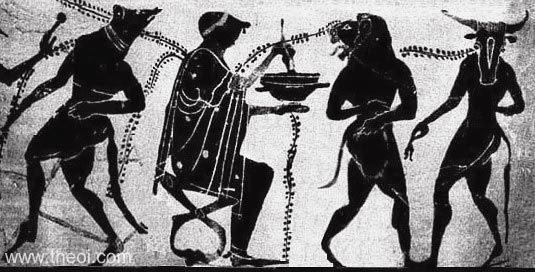
Aeschylus, Circe (lost play) (Greek tragedy C5th B.C.) :
Aeschylus' lost satyr-play Circe told the story of Odysseus' encounter with the witch Circe.
Vase paintings from the period suggest that Odysseus' half-transformed animal-men formed the chorus in place of
the usual Satyrs.
Pseudo-Apollodorus, Bibliotheca E7. 14 - 19 (trans. Aldrich) (Greek mythographer C2nd
A.D.) :
"With his one ship he [Odysseus] reached Aiaia (Aeaea). Kirke (Circe) lived here, a daughter of Helios and
Perse, and the sister of Aeetes. She was skilled in the use of all charms, potions, and spells. Odysseus divided
his men by lot into two groups. He himself fell into the group that remained at the ship, and Eurylokhos
(Eurylochus) went off with twenty-two comrades to see Kirke. When she invited them in, they all entered except
Eurylokhos. She gave each one of them a potion of cheese, honey, barley-groats, and wine, into which she had
mixed a drug. When they had drunk it, with a touch of her wand she changed them into different shapes, some into
wolves, some pigs, some asses, and some into lions. Eurylokhos reported all this to Odysseus after he had
watched it happen. Odysseus went to see Kirke with some moly, which Hermes had given him, and by adding it to
her drugs he alone was able to drink without being enchanted. He then drew his sword with the thought of slaying
Kirke, but she mollified him and gave his comrades back their shapes. And after she swore not to hurt him,
Odysseus slept with her, and fathered Telegonos (Telegonus). After lingering there for a year, Odysseus sailed
the Ocean, offered sacrifices to the souls of the dead, and, following Kirke's instructions, asked for
prophecies from Teiresias (TIresias) . . . After returning to Kirke, Odysseus was sent on his way by her.
As Odysseus sailed past, he wanted to hear their [the Seirenes (Sirens)] song, so, following Kirke's
instructions, he plugged the ears of his comrades with wax, and had them tie him to the mast."
Lycophron, Alexandra 672 ff (trans. Mair) (Greek poet C3rd B.C.) :
"What beast-molding Drakaina (She-Dragon) [Kirke (Circe)] shall he [Odysseus] not behold, mixing drugs with
meal, and beast-shaping doom? And they, hapless ones, bewailing their fate shall feed in the pigstyes, crunching
grapestones mixed with grass and oilcake. But him the drowsy root shall save from harm and the coming of Ktaros
[Hermes]."
Pausanias, Description of Greece 5. 19. 7 (trans. Jones) (Greek travelogue C2nd A.D.)
:
"[Amongst the scenes depicted on the chest of Kypselos (Cypselus) dedicated at Olympia :] There is a grotto
and in it a woman sleeping with a man upon a couch. I was of opinion that they were Odysseus and Kirke (Circe),
basing my view upon the number of the handmaidens in front of the grotto and upon what they are doing. For the
women are four, and they are engaged on the tasks which Homer mentions in his poetry."
Athenaeus, Deipnosophistae 1. 10e (trans. Gullick) (Greek rhetorician C2nd to C3rd
A.D.) :
"[A late Greek rationalisation of the Kirke (Circe) myth :] By way of denouncing drunkenness the poet
[Homer] . . . changes the men who visited Kirke into lions and wolves because of their self-indulgence, whereas
Odysseus is saved because he obeys the admonition of Hermes, and therefore comes off unscathed."
Ptolemy Hephaestion, New History Book 4 (summary from Photius, Myriobiblon 190)
(trans. Pearse) (Greek mythographer C1st to C2nd A.D.) :
"The plant moly of which Homer speaks; this plant had, it is said, grown from the blood of the
Gigante (Giant) killed in the isle of Kirke (Circe); it has a white flower; the ally of Kirke who killed the
Gigante was [her father] Helios; the combat was hard (Greek malos) from which the name of this
plant."
Anonymous, Odyssey Fragment (trans. Page, Vol. Select Papyri III, No. 137) (Greek
epic C3rd-4th A.D.) :
"Unhappy Elpenor, whom Kirke's (Circe's) palace stole away."
Pseudo-Hyginus, Fabulae 125 (trans. Grant) (Roman mythographer C2nd A.D.)
:
"He [Odysseus] came to the island of Aenaria, to Circe, daughter of Sol [Helios], who, by giving a potion,
used to change men into wild beasts. When he sent Eurylochus to her with twenty-two of his men, she changed them
from human form; but Eurylochus in fear did not enter, but fled and reported to Ulysses. Ulysses himself alone
went to her, but on the way Mercurius [Hermes] gave him a charm, and showed him how to deceive Circe. After he
came to Circe and took the cup from her, at Mercurius' [Hermes] suggestion he put in the charm, and drew his
sword, threatening to kill her unless she restored his comrades. Then Circe knew that this had not happened
without the will of the gods, and so, promising that she would not do the like to him, she restored his comrades
to their earlier forms. She herself lay with him, conceived, and bore two sons, Nausithous and Telegonus."
Pseudo-Hyginus, Fabulae 125 :
"He [Odysseus] came to the Sirenes (Sirens), daughters of the Muse Melpomene and Achelous, women in the
upper parts of their bodies but bird below. It was their fate to live only so long as mortals who heard their
song failed to pass by. Ulysses, instructed by Circe, daughter of Sol [Helios], stopped up the ears of his
comrades with wax, had himself bound to the wooden mast, and thus sailed by."
Pseudo-Hyginus, Fabulae 125 :
"He [Odysseus] had come to the island of Sicily to the sacred herds of Sol [Helios], but their flesh lowed
when his comrades cooked it in a brazen kettle. He had been warned by Tiresias and by Circe, too, not to touch
them, and as a result he lost many comrades there."
Ovid, Metamorphoses 14. 248 ff (trans. Melville) (Roman epic C1st B.C. to C1st A.D.)
:
"On Circe's shore we [Odysseus and his men] moored our one last ship but then, remembering Antiphates [the
Laistrygon] and savage Cyclops, we refused to leave the beach; but lots were drawn and I [Akhaimenides] was
chosen to approach those unknown halls. The lot sent me with shrewd Eurylochus and my true friend Polites, and
Elpenor, too fond of wine, and eighteen more of us to Circe's walls. As soon as we arrived and reached the
portal, lions, bears and wolves, hundreds of them together, rushed at us and filled our hearts with fear; but
fear we found was false; they meant no single scratch of harm. No, they were gentle and they wagged their tails
and fawned on us and followed us along, until the maids-in-waiting welcomed us and led us through the marble
vestibule into their mistress' presence. There she sat, in a fine chamber, on a stately throne, in purple robe
and cloak of woven gold; and in attendance Nymphae (Nymphs) and Nereides [i.e. sea-nymphs], whose nimble fingers
never comb a fleece nor spin a skein, but sort and set in baskets grasses and flowers, heaped in disarray, and
herbs of many hues; and as they work she guides and watches, knowing well the lore of every leaf, what blend is
best, and checks them closely as the plants are weighed. She saw us then and, salutations made, her welcome
seemed an answer to our prayers. At once she bade the servants mix a brew of roasted barley, honey and strong
wine and creamy curds, and then, to be disguised in the sweet taste, she poured her essences. We took the bowls
she handed (magic hands!). Our throats were dry and thirsty; we drank deep; and then the demon goddess lightly
laid her wand upon our hair, and instantly bristles (the shame of it! But I will tell) began to sprout; I could
no longer speak; my words were grunts, I grovelled to the ground. I felt my nose change to a tough wide snout,
my neck thicken and bulge. My hands that held the bowl just no made footprints on the floor. And with my friends
who suffered the same fate (such power have magic potions) I was shut into a sty. Eurylochus alone, we saw,
missed a swine's shape, for he alone refused the offered bowl, and, had he not escaped it, I should still be
numbered with that bristly herd today, for from his lips Ulixes [Odysseus] never would have learnt our ruin nor
ever come to Circe for revenge. He had been given by Cyllenius [Hermes], who brings the boon of peace, a flower
which the gods call moly, a white bloom with root of black. Secure with this and heaven's guiding grace, he
entered Circe's halls and as she coaxed him to the treacherous cup and with her wand was trying to stroke his
hair, he thrust her off and drew his sword, and back she shrank in dread. Then trust was pledged and hands were
clasped; she took him to her bed, and he, for wedding gift, called for his comrades' shape to be restored. So we
were sprinkled with the saving juice of some strange herb and on our heads he wand was touched reversed, and
words of countering power were chanted to unspell the chanted spells. The more she sang her charms, the more
erect we rose; our bristles fell; our cloven feet forsook their clefts; our shoulders, elbows, arms came back
again. Our captain was in tears, and we, in tears ourselves, with open arms embraced our lord, and the first
words we spoke, our very first, were words of gratitude. As year we lingered in that land, and much in that long
time I saw and much I heard; and this tale too which I learnt from one of the four acolytes who serve those
magic rites [Akhaimenides then relates the story of Kirke and Pikos (see section below).] . . . Much such tales
I heard and many sights I saw in a long year. Our idleness had made us slow and slack. Then the command came to
set sail again and put to sea. Titania [Circe] had spoken of vast journeyings, perplexing courses, perils of the
sea, the cruel sea, to face. I was afraid and having here found haven here I stayed."
Ovid, Fasti 4. 69 ff (trans.Boyle) (Roman poetry C1st B.C. to C1st A.D.) :
"The Neritian general [Odysseus] came [to Italy]: the Laestrygonians are proof, and the shore with Circe's
name [Circeii in coastal Latium]."
Propertius, Elegies 3. 12 (trans. Goold) (Roman elegy C1st B.C.) :
"He [Odysseus] fled from the bed of Aeaea's weeping queen [Kirke (Circe)]."
CIRCE'S CHILDREN & THE DEATH OF ODYSSEUS
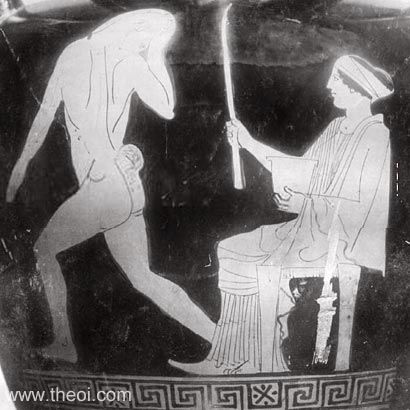
Hesiod, Theogony 1011 ff (trans. Evelyn-White) (Greek epic C8th or C7th B.C.)
:
"And Kirke (Circe) the daughter of Helios, Hyperion's son, loved steadfast Odysseus and bare Agrios
(Agrius) and Latinos (Latinus) who was faultless and strong: also she brought forth Telegonos (Telegonus) by the
will of golden Aphrodite. And they ruled over the famous Tyrrhenians, very far off in a recess of the holy
islands."
Agias of Troezen, The Returns Fragment 4 (from Eustathius on Homer's Odyssey 1796.
45) (trans. Evelyn-White) (Greek epic C7th or 6th B.C.) :
"The Kolophonian (Colophonian) author of the Returns says that Telemakhos (Telemachus) afterwards
married Kirke (Circe), while Telegonos (Telegonus) the son of Kirke correspondingly married Penelope."
Eugammon of Cyrene, Telegony Frag 1 (from Proclus, Chrestomathia) (C6th B.C.)
:
"Telegonos (Telegonus), on learning his mistake, transports his father's body with Penelope and Telemakhos
(Telemachus) to his mother's island, where Kirke (Circe) makes them immortal, and Telegonos marries Penelope,
and Telemakhos Kirke."
Pseudo-Apollodorus, Bibliotheca E7. 36 (trans. Aldrich) (Greek mythographer C2nd
A.D.) :
"When Telegonos (Telegonus) learned from Kirke (Circe) that he was Odysseus' son, he sailed out in search
of his father . . . He took the corpse [of Odysseus] and Penelope to Kirke, and there he married Penelope. Kirke
dispatched them both to the Islands of the Blest."
Pseudo-Plutarch, Greek & Roman Parallel Stories 41 (trans. Babbitt) (Greek
historican C2nd A.D.) :
"Telegonos (Telegonus), the son of Odysseus and Kirke (Circe), was sent [by his mother] to search for his
father, he was instructed to found a city where he should see farmers garlanded and dancing. When he had come to
a certain place in Italy . . . he founded a city, and . . . named it Priniston, which the Romans, by a slight
change, call Praeneste. So Aristokles ((Aristocles) relates in the third book of his Italian
History."
Ptolemy Hephaestion, New History Book 4 (summary from Photius, Myriobiblon 190)
(trans. Pearse) (Greek mythographer C1st to C2nd A.D.) :
"There is, he says, in the Tyrrhenian country a tower called Tower of the Sea, of the name of Sea [Greek
Thalassa ?], a Tyrrhenian poisoner; she worked for Kirke (Circe) and fled from her mistress. It was to her, says
the author, that Odysseus came [at the end of his life]; with the aid of her drugs, she changed him into a horse
and kept him with her until he died of old age. Thanks to this anecdote, the difficulty of the Homeric text is
resolved: ‘Then the sea will send you the softest of deaths.’"
Oppian, Halieutica 2. 497 ff (trans. Mair) (Greek poet C3rd A.D.) :
"That sting [of the sting-ray] it was which his mother Kirke (Circe), skilled in many drugs, gave of old to
Telegonos (Telegonus) for his long hilted spear, that he might array for his foes death from the sea. And he
beached his ship on the island that pastured goats; and he knew not that he was harrying the flocks of his own
father, and on his aged sire who came to the rescue, even on him whom he was seeking, he brought an evil fate.
There the cunning Odysseus, who had passed through countless woes of the sea in his laborious adventures, the
grievous Sting-ray slew with one blow."
Pseudo-Hyginus, Fabulae 125 (trans. Grant) (Roman mythographer C2nd A.D.)
:
"She [Kirke (Circe)] herself lay with him [Odysseus], conceived, and bore two sons, Nausithous and
Telegonus."
Pseudo-Hyginus, Fabulae 127 :
"Telegonus, son of Ulysses [Odysseus] and Circe, sent by his mother to find his father, by a storm was
carried to Ithaca . . . Telegonus with Telemachus and Penelope returned to his home on the island of Aeaea by
Minerva's [Athena's] instructions. They brought the body of Ulysses to Circe, and buried it there. By the advise
of Minerva again, Telegonus married Penelope, and Telemachus married Circe. From Circe and Telemachus Latinus
was born, who gave his name to the Latin language."
CIRCE WRATH : GLAUCUS & SCYLLA
Pseudo-Hyginus, Fabulae 199 (trans. Grant) (Roman mythographer C2nd A.D.)
:
"Scylla, daughter of the River Crataeis, is said to have been a most beautiful maiden. Glaucus loved her,
but Circe, daughter of Sol [Helios], loved Glaucus. Since Scylla was accustomed to bathe in the sea, Circe,
daughter of Sol, out of jealousy poisoned the water with drugs, and when Scylla went down into it, dogs sprang
from her thighs, and she was made a monster. She avenged her injuries, for as Ulysses sailed by, she robbed him
of his companions."
Ovid, Metamorphoses 14. 1 ff (trans. Melville) (Roman epic C1st B.C. to C1st A.D.)
:
"[The sea-god Glaukos (Glaucus) wooed the nymph Skylla (Scylla) :] But Scylla fled. Enraged at his repulse,
he made in fury for the magic halls of Circe Titanis. And now the Euboian merman [Glaucus] through the main, the
main that held his heart, had left behind Aetne . . . the Cyclopes' fields . . . Zancle too behind and Regium's
facing bastions, and the strait, the ship-destroying strait, whose twin shores hem the bounds of Ausonia and
Sicula. Then on he swam with mighty strokes across the Tyrrhene Sea and reached the herb-clad hills and magic
halls of Circe, Sol's [Helios the Sun's] child, crowded with phantom beasts. He met her then and, mutual
greetings given, ‘Goddess,’ he said, ‘Have pity on a god, I beg of you. For you alone Titanis
can ease this love of mine, if only I am worthy. No one knows better than I the power of herbs, for I was
changed by herbs. And I would have you learn my passion's cause : on the Italian coast, facing Messenia's
battlements, I saw Scylla. I blush to tell my wooing words, my promises, my prayers--she scorned them all. But
you, let now your magic lips, if spells have aught of sovereignty, pronounce a spell, or if your herbs have
surer power, let herbs of proven virtue do their work and win. I crave no cure, nor want my wounds made well;
pain need not pass; but make her share my hell!’
But Circe (never heart more sensitive than hers to love's assault, whether the trait was in herself or Venus
[Aphrodite] might perhaps in anger at her father's [Helios the Sun's] gossiping have made her so) said :
‘You would better woo one who is willing, wants the same as you, is caught by love no less. You should be
wooed (How well you could have been!) and if you give some hope, believe me, wooed you well shall be! Trust in
those looks of yours; be bold and brave. See, I the daughter of shining Sol (the Sun), a goddess who possess the
magic powers of spell and herb, I, Circe, pray that I be yours, Spurn her who spurns you; welcome one who wants
you. By one act requite us both!’ But Glaucus answered : ‘Sooner shall green leaves grow in the sea
or seaweed on the hills that I shall change my love while Scylla lives.’
Rage filled the goddess' heart. She had no power nor wish to wound him (for she loved him well), so turned her
anger on the girl he chose. In fury at his scorn, she ground together her ill-famed herbs, her herbs of ghastly
juice, and, as she ground them, Carmina Hecateia [Circe] sang her demon spells. Then in a robe of deepest blue
went forth out of her palace, through the fawning throng of beasts, to Regium that looks across to Zancle's
cliffs. Over the raging waves she passed as if she stepped on solid ground, and skimmed dry-shod the surface of
the sea. There was a little bay, bent like a bow, a place of peace, where Scylla loved to laze, her refuge from
the rage of sea and sky, when in mid heaven the sun with strongest power shone from his zenith and the shade lay
least. Against her coming Circe had defiled this quiet bay with her deforming drugs, and after them had
sprinkled essences of noxious roots; then with her witch's lips had muttered thrice nine times a baffling maze
of magic incantations. Scylla came and waded in waist-deep, when round her lions she saw foul monstrous barking
beasts. At first, not dreaming they were part of her, she fled and thrust in fear the bullying brutes away. But
what she feared and fled, she fetched along, and looking for her thighs, her legs, her feet, found gaping jaws
instead like vile Cerberus. Poised on a pack of beasts! No legs! Below her midriff dogs, ringed in a raging row!
Glaucus her lover, wept and fled the embrace of Circe who had used too cruelly the power of her magic. Scylla
stayed there where she was and, when the first chance came to vent her rage and hate on Circe, robbed Ulixes
[Odysseus] of his comrades."
CIRCE LOVES : CALCHUS
Parthenius, Love Romances 12 (trans. Gaselee) (Greek mythographer C1st B.C.)
:
"The story of Kalkhos (Calchus) the Daunian [region in southern Italy] was greatly in love with Kirke
(Circe), the same to whom Odysseus came. He handed over to her his kingship over the Daunians, and employed all
possible blandishments to gain her love; but she felt a passion for Odysseus, who was then with her, and loathed
Kalkhos and forbade him to land on her island. However, he would not stop coming, and could talk of nothing but
Kirke, and she, being extremely angry with him, laid a snare for him and had no sooner invited him into her
palace but she set before him a table covered with all manner of dainties. But the meats were full of magical
drugs, and as soon as Kalkhos had eaten of them, he was stricken mad, and she drove him into the pig-styles.
After a certain time, however, the Daunians' army landed on the island to look for Kalkhos; and she then
released him from the enchantment, first binding him by oath that he would never set foot on the island again,
either to woo her or for any other purpose."
CIRCE LOVES : PICUS
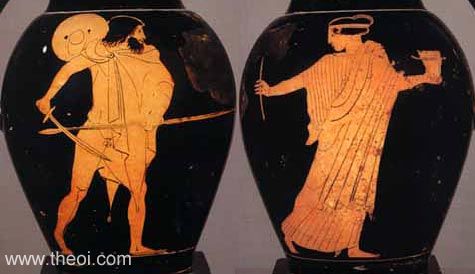
Ovid, Metamorphoses 14. 308 ff (trans. Melville) (Roman epic C1st B.C. to C1st A.D.)
:
"A year we [Odysseus' men] lingered in that land [Kirke (Circe)], and much in that long time I saw and much
I heard; and this tale too which I learnt privately from one of the four acolytes (famulae) who serve those
magic rites. She pointed out to me, one day, while Circe dallied with my lord [Odysseus], a statue of a youth,
in snow-white marble, set in a shrine and gaily garlanded with many a wreath, who bore upon his head a
woodpecker. I asked her who he was, why worshipped in that shrine, and why the bird upon his said, for I was
curious. ‘Listen,’ she said, ‘and learn from this tale too my mistress' magic power and mark
my words. King Picus, son of Saturnus [Kronos (Cronus)], ruled the land of Ausonia [Latium], a king whose chief
delight was chargers for battle. You observe his features. Gaze upon his striking grace and from his likeness
here admire the truth . . . Many a glance he drew from Dryades born among the Latin hills; he was the darling of
the Numina Fontana (Fountain-Sprites) and all the Naides (Naiads) of Albulba and Anio and Almo's streams . . .
[but he loved only Canens, daughter of Janus, and wed her.]
‘Once, as her [Canens] soaring voice poured out its song, Picus left home to hunt the boars that roamed
his countryside. He rode a prancing bay, carried a pair of spears, and wore a cloak of purple with a clasp of
tawny gold. To those same woods [Kirke (Circe)] the daughter of Sol (the Sun) [Helios] had also come from that
Circaean isle named after her, to search the fertile hills for her strange herbs. Unseen in the undergrowth she
saw the young king--saw, and gazed entranced. The herbs fell from her hands. Like blazing fire a thrill of
ecstasy raced through her veins. Then, gathering her smouldering wits, she meant to bare her heart, but could
not come to him, he rode so fast, so close his retinue. "You'll not escape," she cried, "No!
though the wind whirl you away, if I still know myself, if still my spells their magic power retain, nor all the
virtue of my herbs is vain." She summoned up a spectre of a boar, a phantom boar, and made it race across
before his eyes, and dart, or seem to dart, into a spinney where the trees stood close and crowded so no horse
could penetrate. Off in a trice, unconscious of the trick, sped Picus to purse his shadowy prey, and, leaping
nimbly from his foam-flecked horse, fumbled on foot to follow his false hope and soon had wandered deep into the
wood. Then Circe turned to prayers and incantations, and unknown chants to worship unknown gods, chants which
she used to eclipse Luna's (the Moon's) [Selene's] pale face and veil her father's [Helios the Sun's] orb in
thirsty clouds. Now too the heavens are darkened as she sings; the earth breathes vapours; blind along the
trails the courtiers grope; the king has lost his guards; the time and place are hers. "Oh, by your eyes,
those eyes of yours," she said, "that captured mine, and by your beauty, loveliest of kings, that
makes me here, a goddess, kneel to you, favour my passion, and accept as yours my father, who sees all, Sol the
Sun above, and harden not your heart to Circe Titanis' love."
‘But fiercely he repulsed her and her plea. "Be who you may," he cried, "I am not yours.
Another holds my heart and many a year I pray shall hold it. Never will I wound for any stranger's love my
loyalty, while fate keep my Canens Janigena safe for me!" Time after time she pleaded--all in vain.
"You'll pay for this," she said, "never again shall Canens have you home. Now you shall know what
one who's wronged, who loves, who's woman too--and I that loving woman wronged--can do!" Then eastwards
twice and westwards twice she turned, thrice sang a spell, thrice touched him with her wand. He fled and
marvelled that he ran so fast--so strangely fast--then saw he'd sprouted wings! Outraged to find himself so
suddenly a weird new bird in his own woodland glade, he pecked the rough-barked oaks with his hard beak and
wounded angrily the spreading boughs. His wings assumed the purple of his cloak, the golden broach that pinned
his robe became a golden band of feathers round his throat and naught was left of Picus but his name [i.e.
picus is the Latin word for woodpecker]. Meanwhile his courtiers through the countryside were calling
him and calling, but in vain. Picus was nowhere to be found. Instead they chanced on Circe (who by now had
cleared the air and let the wind and sun disperse the mists) and charged her, rightly, with her guilt and
claimed their king and threatened force and aimed their angry spears. She sprinkled round about her evil drugs
and poisonous essences, and out of Erebos and Chaos called Nox (Night) and the Gods of Night (Di
Noties) and poured a prayer with long-drawn wailing cries to Hecate. The woods (wonder of wonders!) leapt
away, a groan came from the ground, the bushes blanched, the spattered sward was soaked with gouts of blood,
stones brayed and bellowed, dogs began to bark, black snakes swarmed on the soil and ghostly shapes of silent
spirits floated through the air. Stunned by such magic sorcery, the group of courtiers stood aghast; and as they
gazed, she touched their faces with her poisoned wand, and at its touch each took the magic form of some wild
beast; none kept his proper shape. The setting sun had bathed Tartesus's shore, and [the wife of Picus] Canens'
watching eyes and heart in vain had waited for her husband. Through the woods her household and the townspeople
had spread with torches in their hands to meet their lord. Nor was the Nympha content to tear her hair and weep
and wail (all that she did); out like a madwoman she rushed herself and roamed the countryside of Latium . . .
[and eventually wasted away in her mourning.]’"
Virgil, Aeneid 7. 187 ff (trans. Day-Lewis) (Roman epic C1st B.C.) :
"[Depicted on the doors of the palace of the king of Latium :] There, holding the augur's staff, arrayed in
a short toga purple-striped, the holy shield on his left arm, sat Picus, tamer of horses: vainly lusting to bed
with him, golden Circe had used her wand and her magic potions, and turned him into a bird, into a pied
woodpecker."
CIRCE & HER SON FAUNUS
The Italian god Faunus was sometimes described as a son of Kirke (Circe) by the god Poseidon.
Nonnus, Dionysiaca 13. 327 ff (trans. Rouse) (Greek epic C5th A.D.) :
"Phaunos (Faunus) came [to join Dionysos in his war against the Indians], leaving the firesealed Pelorian
plain of three-peak Sikelia (Sicily) the rocky, whom Kirke ((Circe) bore embraced by Kronion (Cronion) of the
Deep [Poseidon], Kirke the witch of many poisons, Aietas's (Aeetes') sister, who dwelt in the deep-shadowed
cells of a rocky palace."
Nonnus, Dionysiaca 37. 10 ff :
"Phaunos (Faunus) who was well practised in the secrets of the lonely thickets which he knew so well, for
he had learnt about the highland haunts of Kirke (Circe) his mother."
Nonnus, Dionysiaca 37. 56 ff :
"Phaunos (Faunus) the son of rock-loving Kirke (Circe), the frequenter of the wilderness, who dwelt in the
Tyrsenian land, who had learnt as a boy the works of his wild mother."
CIRCE INVENTRESS OF MAGIC & SPELLS
Kirke (Circe) was sometimes regarded as the inventress of magic and spells. In the Homeric Epigram (below) she is invoked almost as the daimona (spirit) of magic.
Homer's Epigrams 14 (trans. Shewring) (Greek epic C8th B.C.) :
"[Invocation to Kirke (Circe) :] Daughter of Helios, Kirke the witch (polypharmake), come cast
cruel spells; hurt both these men and their handiwork."
Diodorus Siculus, Library of History 4. 45. 1 (trans. Oldfather) (Greek historian
C1st B.C.) :
"[A late greek rationalisation of the Kirke (Circe) myth :] She [Hekate (Hecate, daughter of Perses the
brother of Aeetes] married Aeetes and bore two daughters, Kirke (Circe) and Medea, and a son Aigialeus. Although
Kirke also, it is said devoted herself to the devising of all kinds of drugs and discovered roots of all manner
of natures and potencies such as are difficult to credit, yet, notwithstanding that she was taught by her mother
Hekate about not a few drugs, she discovered by her own study a far greater number, so that she left to the
other woman no superiority whatever in the matter of devising uses of drugs. She was given in marriage to the
king of the Sarmatians, whom some call Skythians (Scythians), and first she poisoned her husband and after that,
succeeding to the throne, she committed many cruel and violent acts against her subjects. For this reason she
was deposed from her throne and, according to some writers of myths, fled to the ocean, where she seized a
desert island, and there established herself with the women who had fled with her, though according to some
historians she left the Pontos and settled in Italia on a promontory which to this day bears after her the name
Kirkaion (Circaeum)."
Diodorus Siculus, Library of History 4. 50. 6 :
"[Medea] said [to the Argonauts] that she had brought with her many drugs of marvellous potency which had
been discovered by her mother Hekate (Hecate) and by her sister Kirke (Circe); and though before this time she
had never used them to destroy human beings, on this occasion she would be means of them easily wreak vengeance
upon men who were deserving of punishment."
Diodorus Siculus, Library of History 4. 54. 5 :
"[Medea] entered the palace [of King Kreon (Creon) of Korinthos (Corinth)] by night, having altered her
appearance by means of drugs, and set fire to the building by applying to it a little root which had been
discovered by her sister Kirke (Circe) and had the property that when once it was kindled it was hard to put
out."
Statius, Thebaid 4. 536 ff (trans. Mozley) (Roman epic C1st A.D.) :
"She [the seeress Manto] obeys, and weaves the charm wherewith she disperses the Shades and calls them back
when scattered; potent, but without their [the witches'] crimes [who desecrate the graves of the dead in their
version of nekromankia], as do the Colchian maiden [Medea], or the enchantress (simulatrix) Circe on
the Aeaean strand."
CULT OF CIRCE
I. PHARMACUSSAE (PHARMAKOUSSAI) Islands near Attica (Southern Greece)
Strabo, Geography 9. 1. 13 (trans. Jones) (Greek geographer C1st B.C. to C1st A.D.)
:
"Here [off the coast of Attika], too, are the Pharmakoussai (Pharmacussae, Witch-Islands), two small
islands, on the larger of which is to be seen the tomb of Kirke (Circe)."
[
N.B. Kirke was usually described as an immortal goddess. A "tomb" was usually the shrine of
hero-cult.]
II. CIRCAEUM (KIRKAION) Mountain in Latium (Central Italy)
Strabo, Geography 5. 3. 6 (trans. Jones) (Greek geographer C1st B.C. to C1st A.D.)
:
"Kirkaion (Circaeum) [in Italy] is a mountain which has the form of an island, because it is surrounded by
sea and marshes. They further say that Kirkaion is a place that abounds in [medicinal] roots - perhaps because
they associate it with the myth about Kirke (Circe). It has a little city and a temple of Kirke and an altar of
Athene (Athena), and people there show you a sort of bowl which, they say, belonged to Odysseus."
Cicero, De Natura Deorum 3. 19 (trans. Rackham) (Roman rhetorician C1st B.C.)
:
"[Cicero's philosophical critique on the nature of the gods :] If Ino is to be deemed divine . . . because
she is the daughter of Cadmus, are Circe and Pasiphae and Aeetes, the children of Perseis the daughter of
Oceanus by Sol (the Sun) [Helios], to be not counted in the list of gods? In spite of the fact that Circe too is
devoutly worshipped at the Roman colony of Circei . . . If these are not divine, I have my fears as to what will
become of Ino [the goddess Leukothea (Leuconthea)], for the claims of all of them derive from the same source
[i.e. Homer's Odyssey]."
ANCIENT GREEK ART
SOURCES
GREEK
- Homer, The Odyssey - Greek Epic C8th B.C.
- Homerica, Homer's Epigrams - Greek Epic C8th - 7th B.C.
- Hesiod, Theogony - Greek Epic C8th - 7th B.C.
- Epic Cycle, The Returns Fragments - Greek Epic C7th - 6th B.C.
- Epic Cycle, The Telegony Fragments - Greek Epic C8th - 6th B.C.
- Apollodorus, The Library - Greek Mythography C2nd A.D.
- Apollonius Rhodius, The Argonautica - Greek Epic C3rd B.C.
- Lycophron, Alexandra - Greek Poetry C3rd B.C.
- Parthenius, Love Romances - Greek Mythography C1st B.C.
- Diodorus Siculus, The Library of History - Greek History C1st B.C.
- Strabo, Geography - Greek Geography C1st B.C. - C1st A.D.
- Pausanias, Description of Greece - Greek Travelogue C2nd A.D.
- Plutarch, Parallel Stories - Greek Historian C1st - 2nd A.D.
- Athenaeus, Deipnosophistae - Greek Rhetoric C3rd A.D.
- Ptolemy Hephaestion, New History - Greek Mythography C1st - 2nd A.D.
- Quintus Smyrnaeus, Fall of Troy - Greek Epic C4th A.D.
- Greek Papyri III Anonymous, Odyssey Fragments - Greek Poetry C3rd - 4th A.D.
- Nonnus, Dionysiaca - Greek Epic C5th A.D.
ROMAN
- Hyginus, Fabulae - Latin Mythography C2nd A.D.
- Ovid, Metamorphoses - Latin Epic C1st B.C. - C1st A.D.
- Ovid, Fasti - Latin Poetry C1st B.C. - C1st A.D.
- Virgil, Aeneid - Latin Epic C1st B.C.
- Propertius, Elegies - Latin Elegy C1st B.C.
- Cicero, De Natura Deorum - Latin Rhetoric C1st B.C.
- Valerius Flaccus, The Argonautica - Latin Epic C1st A.D.
- Statius, Thebaid - Latin Epic C1st A.D.
OTHER SOURCES
Other references not currently quoted here: Argonautica Orphica 1216, Dionysius of Halicarnassus 1.72.5, Strabo 1.2.40, Euripides Medea.
BIBLIOGRAPHY
A complete bibliography of the translations quoted on this page.
